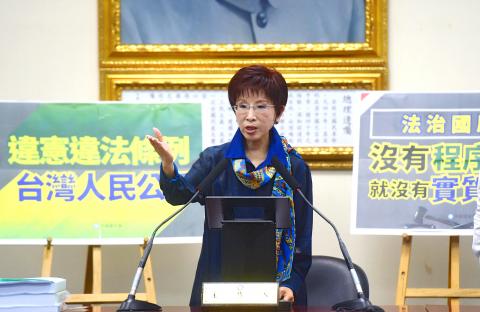The Act Governing the Handling of Ill-gotten Properties by Political Parties and Their Affiliate Organizations (政黨及其附隨組織不當取得財產處理條例) is filled with clauses that are unconstitutional, Chinese Nationalist Party (KMT) Chairwoman Hung Hsiu-chu (洪秀柱) said yesterday, adding that the KMT would file for a constitutional interpretation by the Council of Grand Justices regarding the implementation of the act.
However, the KMT would first request a constitutional interpretation on the Law of Interpretation Procedures For Grand Justices (司法院大法官審理案件法), which states that a request for an interpretation may be filed only if one-third of incumbent legislators sign a petition, Hung said.
The Legislative Yuan has 113 seats, of which the KMT holds 35. According to the current law, the KMT needs at least 38 signatures to file for an appeal.

Photo: Chien Jung-fong, Taipei Times
Hung said that the KMT plans to ask the council to make an exception for the party, which would then enable it to file another request for the council to make a constitutional interpretation of the ill-gotten properties act.
“The Democratic Progressive Party [DPP] government claims that the [ill-gotten properties] act is a part of the implementation of transitional justice, but it is only a political move to destroy the KMT and install themselves as the sole, uncontested, political party in Taiwan,” Hung said.
“The DPP said the act was based on Taiwan being a nation ruled by law and used East Germany as an example of how the party expected the act to handle the KMT’s assets, but it is only an attempt to cover up the unconstitutional clauses in the act,” she said.
“East Germany was a Soviet Union-backed Communist autocracy and lacked democratic legitimacy in the first place, and after the reunion of the two Germanys into modern Germany, there was ample reason to handle the party assets under the Socialist Unity Party of Germany,” she added.
However, Hung said that Taiwan’s democratic constitutional order has not been interrupted since the Republic of China (ROC) announced the implementation of its Constitution in 1947, under which the DPP has been elected to the presidency twice and there have been three alternations of political power since 2000.
KMT Evaluation and Discipline Committee Chairman Liu Han-ting (劉漢廷) said that despite the unorthodox method the party is taking to request constitutional interpretations, the 1,125th interpretation given on Sept. 10, 1999, said that while parties and individuals could not request a constitutional interpretation until all other judicial options have been exhausted, if the facts surrounding the incident are clear and the incident is clearly related to the Constitution, the council could accept individual requests for interpretations.
Hung said that the KMT has pointed out at least 10 items in the act that it believes are unconstitutional, adding that the KMT hopes the Council of Grand Justices will accept the party’s petition in order to protect Taiwan’s democracy.

Taiwan is stepping up plans to create self-sufficient supply chains for combat drones and increase foreign orders from the US to counter China’s numerical superiority, a defense official said on Saturday. Commenting on condition of anonymity, the official said the nation’s armed forces are in agreement with US Admiral Samuel Paparo’s assessment that Taiwan’s military must be prepared to turn the nation’s waters into a “hellscape” for the Chinese People’s Liberation Army (PLA). Paparo, the commander of the US Indo-Pacific Command, reiterated the concept during a Congressional hearing in Washington on Wednesday. He first coined the term in a security conference last

Prosecutors today declined to say who was questioned regarding alleged forgery on petitions to recall Democratic Progressive Party (DPP) legislators, after Chinese-language media earlier reported that members of the Chinese Nationalist Party (KMT) Youth League were brought in for questioning. The Ministry of Justice Investigation Bureau confirmed that two people had been questioned, but did not disclose any further information about the ongoing investigation. KMT Youth League members Lee Hsiao-liang (李孝亮) and Liu Szu-yin (劉思吟) — who are leading the effort to recall DPP caucus chief executive Rosalia Wu (吳思瑤) and Legislator Wu Pei-yi (吳沛憶) — both posted on Facebook saying: “I

The Ministry of Economic Affairs has fined Taobao NT$1.2 million (US$36,912) for advertisements that exceed its approved business scope, requiring the Chinese e-commerce platform to make corrections in the first half of this year or its license may be revoked. Lawmakers have called for stricter enforcement of Chinese e-commerce platforms and measures to prevent China from laundering its goods through Taiwan in response to US President Donald Trump’s heavy tariffs on China. The Legislative Yuan’s Finance Committee met today to discuss policies to prevent China from dumping goods in Taiwan, inviting government agencies to report. Democratic Progressive Party Legislator Kuo Kuo-wen (郭國文) said

Sung Chien-liang (宋建樑), who led efforts to recall Democratic Progressive Party (DPP) Legislator Lee Kun-cheng (李坤城), was released on bail of NT$80,000 today amid outcry over his decision to wear a Nazi armband to questioning the night before. Sung arrived at the New Taipei District Prosecutors’ Office for questioning in a recall petition forgery case last night wearing a red armband bearing a swastika, carrying a copy of Adolf Hitler’s Mein Kampf and giving a Nazi salute. Sung left the building at 1:15am without the armband and covering the book with his coat. Lee said today that this is a serious